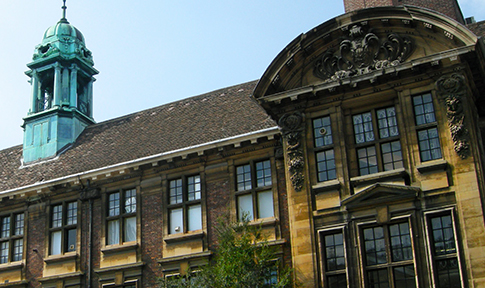All about the Fly Facility

All About the Fly Facility
The University of Cambridge Department of Genetics is primarily located in a large Edwardian building close to the centre of town. The department has a long and distinguished history of Drosophila research beginning with John Thoday’s evolutionary genetics work in the late 1950s and continuing through Michael Ashburner’s wide-ranging studies from the 1970s onwards. A strong Drosophila theme persists to the present day, with several fly groups currently active in the department. Research interests include computational genomics, cell cycle, cell polarity, neurobiology and host-parasite interactions.
Drosophila research in the Department of Genetics is supported by the Fly Facility, which also provides a range of services to the wider fly community. The Fly Facility grew out of Michael Ashburner’s fly lab under the direction of John Roote. John retired in 2012 and was replaced by Simon Collier in spring 2013. Since 2010, the facility has operated on a non-commercial, cost-recovery basis, with running costs supported by charges for its services.
The Fly Facility offers an embryo microinjection service and currently performs around 800 microinjection series annually. Injections are performed for P-element transformation, phiC31 transgenesis, CRISPR and other experiments. The facility also provides screening and balancing services. To date, injections have been primarily into D. melanogaster, but have included some non-melanogaster species (including psuedoobscura, sechellia, suzukii and yakuba), and the facility aims to increase the range of insect hosts in the future.
The Fly Facility has also provided support for some large-scale genetic projects, including the production of the Drosdel deficiency kit, as well as for individual group projects, such as the generation of novel split-Gal4 lines for the Greg Jefferis lab (MRC Laboratory of Molecular Biology, Cambridge).
Fly Facility infrastructure includes a large fly lab (the John Thoday lab, opened in 2004) with 24 fly workstations and four large Constant Temperature rooms that will each hold around 15,000 fly stocks. The facility offers a Drosophila stock-keeping service and currently maintains thousands of stocks for numerous Cambridge fly groups. There is also a media room that produces around 7000 litres of fly food annually for Cambridge fly groups. In addition, the facility has a dedicated cage facility for large fly cultures and an Isolation lab for working with quarantined stocks.
The Fly Facility also aims to provide a range of resources for the fly community through the website. Currently there are links to a Drosophila training package developed in collaboration with the University of Manchester Fly Facility, and advice on culturing mite-free flies. Our goal is to provide the very best services and resources to the fly community and input from the community on how we can best achieve this is always welcome.
